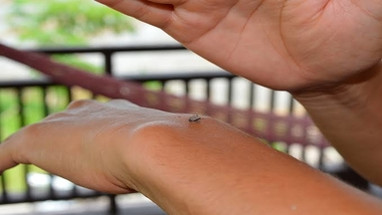19th Jul 2018
Mosquito Attraction For Different People
Mosquito-attracting people
Do you come away from a backyard BBQ covered in red, itchy bites, while your friend or partner gets away with none?Some people are far more likely to be bitten by mosquitoes, and it’s not just about bad luck or sitting in the wrong place – there are a number of factors that can make you more appetising to the tiny summer pests.
Studies show that around 20% of people are particularly delicious to mosquitoes, which makes them attract far more bites than the rest of the population. Unfortunately, many of the reasons are beyond your control – personal body chemistry and blood type are major factors.
It’s in the blood
Mosquitoes drink your blood, so it makes sense that different blood types might be more appealing than others. Although the science on mosquitoes and blood types is incomplete, one study showed that the insects landed on people with type O blood twice as much as those with type A. People with type B blood were somewhere in between. There’s no consensus on why certain blood types are more appealing.
Another, less obvious factor that most people wouldn’t be aware of is whether you telegraph your blood type through your skin. Around 85% of people release a chemical signal through the skin that tells mosquitoes what blood type they have. The remaining 15% keep it hidden. Mosquitoes tend to be more attracted to the people who secrete this chemical, and less attracted to those who do not, regardless of their blood type.
If you feel that you’re constantly bitten, you could be a type O secretor.
Bites and body chemistry
The scent of carbon dioxide also helps mosquitoes find their targets. We all emit this substance when we exhale, but the amount varies. Generally, the larger you are, the more CO2 you exhale with each breath. This is probably why children are slightly less likely to be bitten than adults.
Bacteria on the skin also play a role. Studies have shown that mosquitoes are attracted to people with high concentrations of certain strains of bacteria on their skin. People with a wider range of bacteria were less likely to be bitten. Unfortunately, this is not something you can test or control at home.
When exercise has unintended consequences
Exercise is great, but it can make you more attractive to mosquitoes in the short term. The insects smell substances secreted in sweat – like lactic acid, uric acid, and ammonia – and they’re also more attracted to people with higher body temperatures. So if you’ve just been for a run, it might be a good idea to shower and cool down before you head out to the garden.
Genetic factors mean some people secrete more sweat and higher levels of uric and other acids than others, which means they’re more likely to be bitten whether they’ve just exercised or not.
Expect more bites if you’re expecting
Pregnant women tend to be more attractive to mosquitoes – in fact, in one study they were bitten at twice the rate of non-pregnant people. This comes down to a couple of factors.
One, mosquitoes are attracted to body heat and pregnant women are warmer, with body temperatures around 1-2 degrees higher than the general population. Second, they exhale far more carbon dioxide than others, which helps mosquitoes find them more easily.
In Zika-prone areas, this could make things more dangerous for pregnant women. They can mitigate the risks by wearing clothing that covers skin, using safe repellants, and avoiding the outdoors at dusk.
Bites and beer drinking
It sounds silly, but beer drinking has been shown to increase mosquito bites. One study showed that even a single beer increased the drinker’s likelihood of being bitten.
Researchers theorised that drinking increases ethanol content in sweat, but this turned out to be incorrect. At this point, nobody really knows why beer makes such a difference.
Clothing choices
Long sleeves, socks, and full-length pants can help you avoid some bites, but that’s not the only way your clothing choices can influence your appeal. Mosquitoes use visual cues as well as scent to spot their victims.
If you wear colors that stand out against the environment – think black, red, or bright shades – you may be more likely to be bitten. Paler colors and neutrals may be a better option for your next cookout.
Lowering your risk
Unfortunately, many of the factors that make you more appealing to mosquitoes come down to genetics and body type. You can’t do much about your blood type, secretions, or tendency to sweat.
The good news is research into bites is now focused on the people who seem to attract the fewest bites. Understanding what makes these individuals less appealing should help researchers develop a new generation of repellants that work more effectively.
In the meantime, if you’re particularly sweaty, blood type O, pregnant, or just mysteriously prone to being bitten, you can use a repellant, wear clothing to cover skin, and invest in Envirosafe traps to reduce the mosquito population on your property.

